
-
Find the right food for your petTake this quiz to see which food may be the best for your furry friend.Find the right food for your petTake this quiz to see which food may be the best for your furry friend.Featured products
 Hypoallergenic Small & Mini Adult Dog Food
Hypoallergenic Small & Mini Adult Dog FoodHILL'S SCIENCE PLAN Hypoallergenic Small&Mini Adult dog food with Salmon is complete pet food for adult small dogs 1–6 years old. It's formulated for dogs with delicate skin and stomach, with limited high quality novel protein sources & no grain.
Shop Now Perfect Digestion Small & Mini Adult Dog Food
Perfect Digestion Small & Mini Adult Dog FoodHill's Science Plan Perfect Digestion Small & Mini Adult Dog Food with Turkey is a complete premium pet food for small breed adult dogs aged 1–6 years. This deliciously smooth mousse is precisely balanced to deliver the appropriate amount of energy and to support digestive health in adult, small breed dogs.
Shop Now Perfect Weight Small & Mini Adult Dog Food
Perfect Weight Small & Mini Adult Dog FoodHill's Science Plan Adult Small & Mini Dog Food with Turkey is a complete premium pet food for adult small dogs from 1 year old that are prone to weight gain or slightly overweight. This deliciously smooth mousse is formulated to deliver the appropriate amount of energy to support weight maintenance in adult dogs.
Shop NowFeatured products Sterilised Mature Adult Cat Food
Sterilised Mature Adult Cat FoodHill's Science Plan Sterilised Cat Mature Adult Cat Food with Chicken is specially formulated with ActivBiome+ Multi-Benefit Technology. It is a precisely balanced nutrition tailored to meet the needs of mature adult sterilised cats, ages 7+, and to promote graceful ageing.
Shop Now Urinary Health Adult Cat Food with Chicken
Urinary Health Adult Cat Food with ChickenHill's Science Plan Urinary Health Adult Cat Food with Chicken supports the health of the whole urinary system. Suitable for sterilised cats.
Shop Now Oral Care Adult Cat Food
Oral Care Adult Cat FoodHill's Science Plan Oral Care Adult Cat Food with Chicken contains clinically proven kibble technology to reduce plaque & tartar build up.
Shop Now -
Dog
- Dog Tips & Articles
-
Health Category
- Weight
- Food & Environmental Sensitivities
- Urinary
- Digestive
- Joint
- Kidney
-
Life Stage
- Puppy Nutrition
- Adult Nutrition
- Senior Nutrition
Cat- Cat Tips & Articles
-
Health Category
- Weight
- Skin & Food Sensitivities
- Urinary
- Digestive
- Kidney
-
Life Stage
- Kitten Nutrition
- Adult Nutrition
Featured articles Develop your gut instinct | Hill's Pet
Develop your gut instinct | Hill's PetDigestive disorders can affect any part of the digestive system, from the stomach, small intestine and through to the large intestine.
Read More Tips For Mixing Wet And Dry Pet Food
Tips For Mixing Wet And Dry Pet FoodDiscover tips for mixing wet and dry pet food to ensure balanced nutrition and variety for your pet. For comprehensive feeding advice, visit Hill's Pet UK.
Read More Virtual Vet Visits: What You Need to Know
Virtual Vet Visits: What You Need to KnowLearn the ins and outs of a televet appointment before you talk to a vet online.
Read More -


Have you noticed that your cat comes running whenever you open a can of olives? Maybe you've even offered an olive to your cat, only to see them react with unbridled excitement. But should cats consume olives? What about olive oil? Although it can be a lot of fun to share these salty snacks with your cat, you'll want to consider a few things before you do.
Why Do Cats Love Olives?
There are no scientific studies that delve into the mysterious reasons as to why cats go crazy for olives, but there are some theories. Some cats may just love the taste or enjoy the interaction with you during treat time. Others may like the way they feel after eating olives. That's because olives, particularly green olives, contain an active chemical compound that's very similar in structure to a compound found in catnip called nepetalactone, according to Wired. Nepetalactone is the active chemical that is thought to be responsible for the silly behaviour that cats exhibit after consuming the leaves, stems and flowers of catnip.
Any unfamiliar and interesting scent, as could be Nepetalactone, cats use their vomeronasal organ to analyse it. As noted by Mental Floss, the vomeronasal organ is basically a sensing, smelling nose-brain located at the top of the back of the throat in cats and other mammals. The cat uses its mouth to suck in air which is filtered into the vomeronasal organ. The vomeronasal organ can also detect pheromones, which are chemical “messengers” that cats release from special glands around cats’ bodies to “communicate” among them. Specifically to Nepetalactone contained in catnip, cats use predominantly their accessory olfactory system that activates part of the brain involved in sexual behaviour. In general, Nepetalactone stimulates behaviours such as sniffing, chewing, rolling, rubbing and predatory behaviour. After consuming nepetalactone, your cat may roll around, act sillier and more playful than usual and have dilated eyes. Thereby, it is hypothesised that cats like olives because it leads to similar catnips’s effects.
Not all cats act silly after eating catnip or olives, though. Your cat may enjoy eating olives and experience no changes in their behaviour whatsoever after snacking on them.
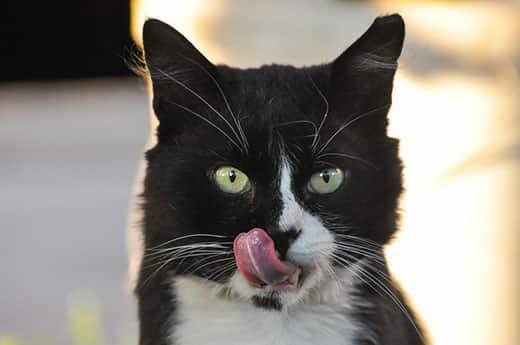
Can Cats Eat Olives Safely?
In general, olives are not a dangerous food for cats; they're considered safe for them to consume in very small quantities. Eating a tiny olive snack, meaning less than a whole olive, a couple of times a week should be fine for your cat if they've eaten olives in the past without any negative side effects.
But can cats eat olives and olive oil? They're regarded as healthy snacks for humans, but olives should be considered purely empty-calorie treats for cats. And olive oil may not be a welcome addition in your cat's diet — more to come on that later. Though they may taste delicious and have an amusing effect on your cat's behaviour, olives are known to be high in sodium, and therefore, should make up no more than 10 percent of your cat's daily calories, as with any treat.


Tasty Tips
Can Cats Have Olive Oil?
Olive oil is considered a healthy part of human nutrition, but can cats eat olive oil? Yes, although it may not be a good idea.
Although olive oil isn't considered poisonous to cats, consuming too much of any fat, including olive oil, may cause your cat to experience diarrhoea and vomiting. If you use olive oil for cooking, a tiny piece of food cooked in it shouldn't be a cause for alarm if your cat eats some, as long as your cat doesn't exhibit any adverse health effects afterward. However, it should also be mentioned that olive oil is very high in fat content, and has its own inherent health risks, so always check with your veterinarian before feeding food not specifically formulated for cats.
Safety Concerns About Olives
Generally speaking, there are few safety concerns with cats eating olives or olive oil other than the possibility of mild stomach upset or diarrhoea. Avoid giving your cat olives in the future if you notice any negative side effects after they consume this snack.
Olives are often stuffed with delicious human-friendly treats, like blue cheese, almonds, garlic, sausage or pickled jalapenos. While olives are not considered to be toxic to cats, the items they're stuffed with may be. Avoid giving your cat olives stuffed with anything other than a pimento or olives that have pits, as pits can be a choking hazard or can cause intestinal obstruction if they're swallowed.
The other main concern with olives and olive oil is sodium toxicity. According to The Guardian, olives need to be cured before consumption, and a common way to cure them is through brining in salt water. Salt-brined olives are high in sodium, and feeding these to your cat on a regular basis may expose them to harmful levels of salt.
Olives aren't a good treat if your cat has health concerns with sodium, such as heart disease or kidney disease. It's also important to note that washing olives with water doesn't reduce the amount of sodium that's present in them. However, healthy cats can typically indulge in a quarter of a large olive or half of a small olive a couple of times a week without experiencing any negative health effects. Always try to limit any snacks separate from your cat's regular food to not exceed ten percent of their daily caloric content. Also, always check with your veterinarian before feeding any food not specifically formulated for cats.


Dr. Sarah Wooten graduated from UC Davis School of Veterinary Medicine in 2002. A member of the American Society of Veterinary Journalists, Dr. Wooten divides her professional time between small animal practice in Greeley, Colorado, public speaking on associate issues, leadership, and client communication, and writing. She enjoys camping with her family, skiing, SCUBA, and participating in triathlons.
Related products

Hill's Science Plan Oral Care Adult Cat Food with Chicken contains clinically proven kibble technology to reduce plaque & tartar build up.

Hill's Science Plan Sterilised Cat Mature Adult Cat Food with Chicken is specially formulated with ActivBiome+ Multi-Benefit Technology. It is a precisely balanced nutrition tailored to meet the needs of mature adult sterilised cats, ages 7+, and to promote graceful ageing.
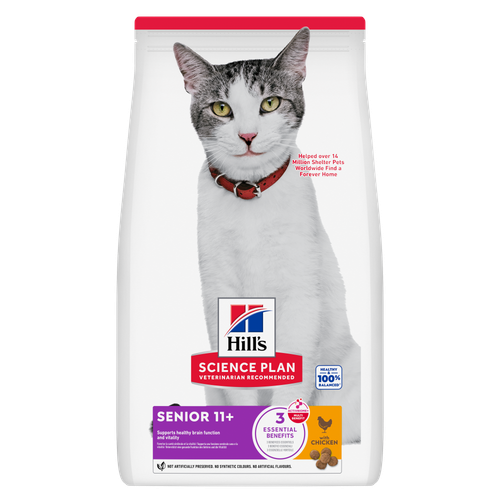
Hill's Science Plan Senior Cat Food with Chicken is a complete pet food, specially formulated with ActivBiome+ Multi-Benefit Technology.
This food supports healthy aging during the golden years. Contains a special ingredient blend to help keep older cats agile, more alert & interactive.

Hill's Science Plan Urinary Health Adult Cat Food with Chicken supports the health of the whole urinary system. Suitable for sterilised cats.
Related articles
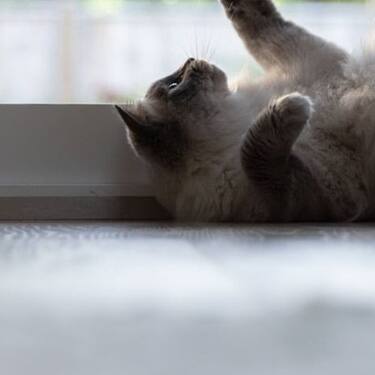
Feeding time can be a wonderful bonding opportunity for you and your cat. Find out how to make the most of it and create a healthy habit with HIll's Pet UK.
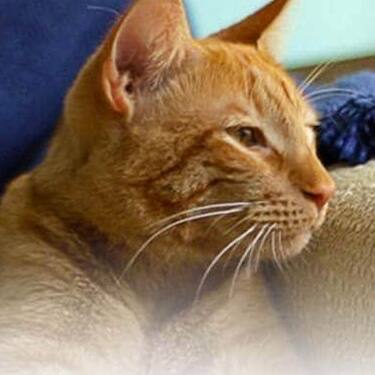
Find the right Hill
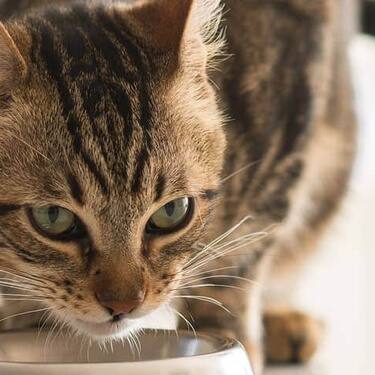
Discover what you can do to spot and support a sensitive cat stomach. See what routines and food you can implement to help your cat be happy and healthy.
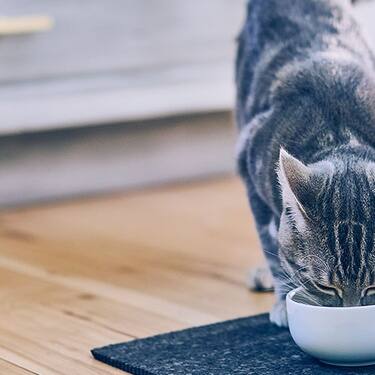
Good nutrition is about the right balance of nutrients. Learn more about health issues when feeding a cat food that has an improper nutritional balance from your friends at Hills Pet Nutrition.

Put your cat on a diet without them knowing
Our low calorie formula helps you control your cat's weight. It's packed with high-quality protein for building lean muscles, and made with purposeful ingredients for a flavourful, nutritious meal. Clinically proven antioxidants, Vitamin C+E, help promote a healthy immune system.
Put your cat on a diet without them knowing
Our low calorie formula helps you control your cat's weight. It's packed with high-quality protein for building lean muscles, and made with purposeful ingredients for a flavourful, nutritious meal. Clinically proven antioxidants, Vitamin C+E, help promote a healthy immune system.

